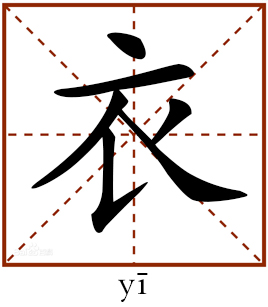Clothing

This character means clothing. Some anthropologists refer to clothes as “social skin,” indicating that what we wear has social significance. It is believed that clothes not only reveal some personality traits of the wearer, but also indicate a region’s history and identity.
衣锦夜行
yī jǐn yè xíng
Yi is “cloth” while jin means “gorgeous,” ye “the night” and xing “to walk.” These characters, together, mean a person in gorgeous clothes walking at night. Usually, the proverb is used to express a situation in which one is unable to show off his wealth, good looks or other good things, just as the person, though in showy dress, is unable to draw attention in the dark.
The proverb was derived from a story about Xiang Yu (232-202 BCE), a famous leader of the rebel force that overthrew the Qin Dynasty (221-207 BCE). After the Qin came to an end, Xiang entered the capital of the Qin and took a large fortune. Despite advice from his subjects to remain in the Guanzhong areas and continue with his conquests, Xiang was insistent on returning to his homeland. He said, “what use is wealth and rank if you do not go home? That is like wearing embroidered clothes at night when nobody can see you. ”
衣钵相传
yī bō xiāng chuán
Yi refers to “cloth” while bo is “an alms bowl,” xiang chuan means “to hand down.” The proverb is used to symbolize that true teachings are handed down from the master.
The proverb originates from a legend about the great Buddhist monk, Bodhidharma. In the legend, when Bodhidharma wished to return to India, he called his disciples together and asked them to say something to demonstrate their understanding. Some of the disciples gave answers but not to the point. Finally, the one named Dazu Huike came forth, bowed deeply in silence and stood up straight. Bodhidharma said, “you have attained my marrow.” He then passed on the symbolic robe and alms bowl of dharma succession to Huike. From then on, yi bo, or the robe and alms bowl, has been used as a symbol of skills, knowledge or belief that is handed down from master to apprentice.
(edited by REN GUANHONG)
